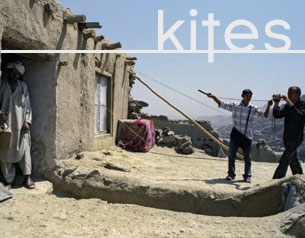Kites
A rare look at daily life in Afghanistan through the camera lenses of a teenage group of new fillmmakers
 'Kites' tells the inspiring story of Kabul's budding young video producers. Through a clever combination of the students' video and their mentor Jacek Szaranski's artful camera work, we take a look at the use of video and high tech in a world more commonly associated with a backward and warmongering existence. A world where under the Taliban it was forbidden to show pictures of human beings, let alone for young women to operate video cameras. 'Kites' tells the story of the potential of young Afghans and their yearning for modernity.
'Kites' tells the inspiring story of Kabul's budding young video producers. Through a clever combination of the students' video and their mentor Jacek Szaranski's artful camera work, we take a look at the use of video and high tech in a world more commonly associated with a backward and warmongering existence. A world where under the Taliban it was forbidden to show pictures of human beings, let alone for young women to operate video cameras. 'Kites' tells the story of the potential of young Afghans and their yearning for modernity.
"I don't understand what 35 years of war means. And for you guys - it's the other way round. We should exchange experience," says Polish director Jacek Szaranski. Jacek is holding a month long film course "Kabul - My City" for twelve talented students from Kabul's Art School. The students are given cameras, some expert tuition and nothing more. The subjects of their films and the way they show Kabul is entirely up to them. Jacek explains, "I want to see this city through your eyes. I want to see the way you see the world."
Interestingly the subjects the students decide to film are not of barbed wire or military bases. Instead they focus their lenses on their daily lives. They film their neighbours, children flying kites and themselves, revealing a normality, at times funny and at others sadly moving.
At the beginning the students struggle with the equipment and techniques. "Sometimes you're in close-up. I don't know why". They make frantic attempts to take stunning pictures of rickshaw wheels turning and feel let down by embarrassed and silent interviewees. But soon the camera ceases being a toy and becomes a tool as they learn to ask the important questions: "What is he afraid of, what is he dreaming of, what he believes in, how he feels. You ask about feelings. They should be important."
A student arranges a family in their living room and asks the father "When were you happy?" The father replies that all his memories are sad. "During those 38 years you didn't have even a tiny moment of happiness?" But then the father finally lightens in mood and tells of one happy time. "Once I was flying the kite on the roof. My mother said to me 'Son go to school!' The fourth time she cut the thread. As I began to run away she couldn't catch me. That was my happy memory."
One group chooses to film a small child lying on the street begging. "We saw how poor he was and we wanted the rest of the world to see it." But they soon realise that sometimes filming can provoke a negative response. "This man kicked the kid and took his money. That one was really pissed off, he shouted 'You are an Afghan, and you show foreigners what is supposed to remain hidden!'"
Throughout the course Jacek encourages the students to film what's interesting, instead of what they deem entertaining and to realise that a level of trust and respect between subject and filmmaker is critical. "The character must feel contact with you. He should trust you. Trust that you won't do him any harm. Because you can do harm with a film as well. A camera is a special device used for looking into the human soul."
'Le Prix SRG SSR idee Suisse/Semaine de la Critique'
FULL SYNOPSIS
